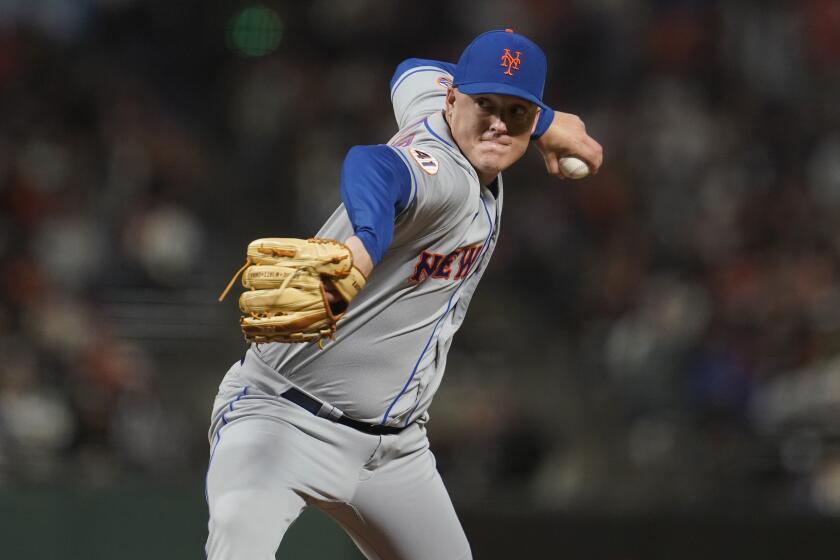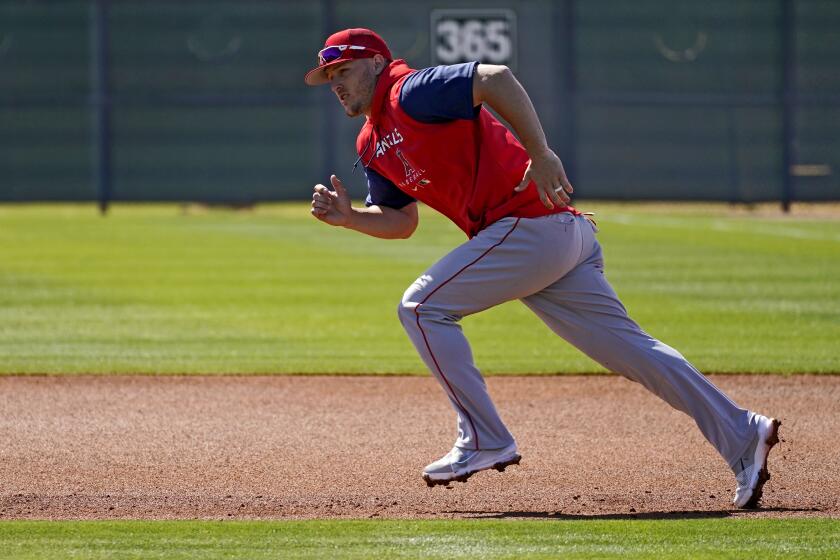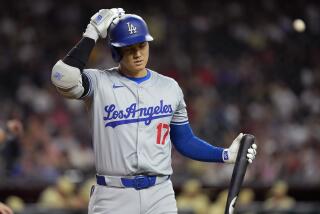Has Shohei Ohtani set the bar too high for future two-way players? Some Angels wonder
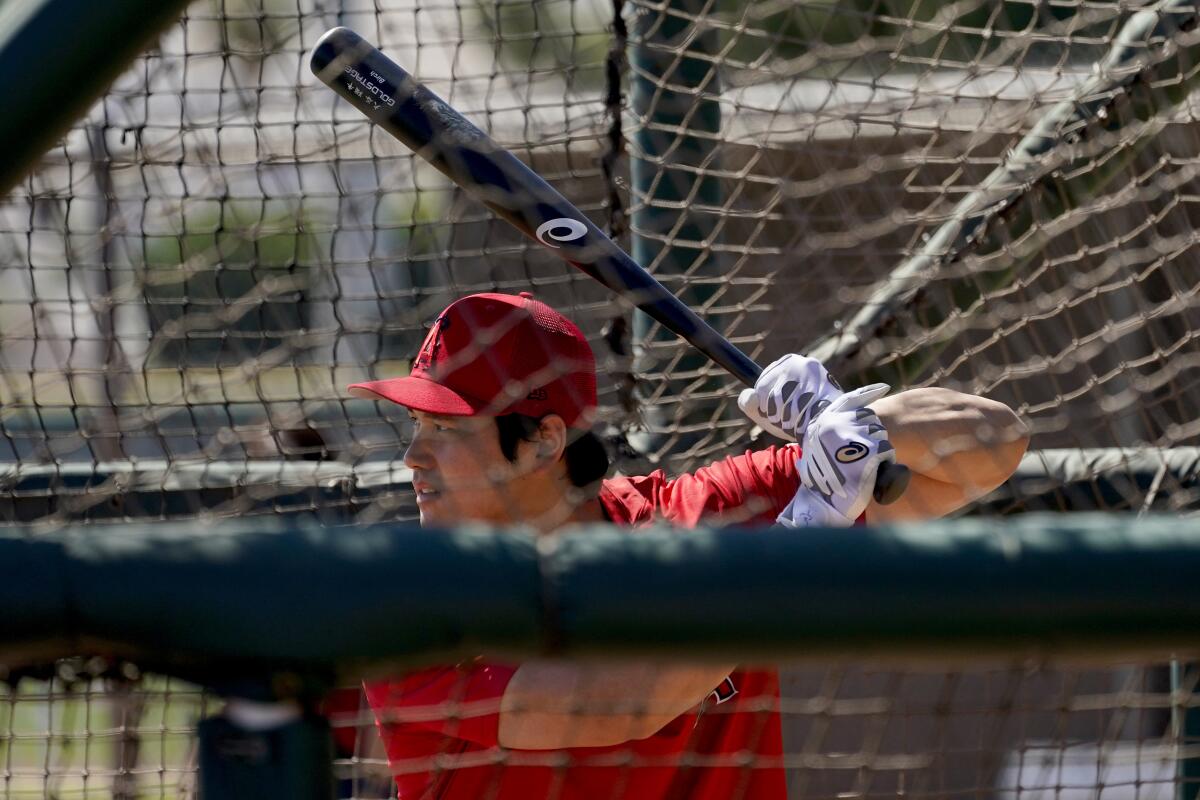
TEMPE, Ariz. — When Jared Walsh reported to spring training as a two-way player in 2019, he felt pretty confident about his chances of playing first base and pitching out of the bullpen in the big leagues.
Then Walsh witnessed Shohei Ohtani’s historic 2021 season, when the two-way phenom hit 46 homers with 100 RBIs and was 9-2 with a 3.18 ERA in 23 starts on the mound, and he realized the folly of his two-way aspirations.
“Oh yeah, absolutely!” Walsh said, when asked if he thought he could be a two-way player before Ohtani’s breakout season. “I was like, ‘This is gonna be no problem.’ Then I saw him, and I was like, ‘Ah, I don’t want to do that much work,’ so I’m not doing it.”
Ohtani morphed into a worldwide sensation last season, his ability to throw baseballs 100 mph and hit them 450 feet producing a season the sport had not seen since Babe Ruth a century ago.
The left-handed-hitting Ohtani batted .257 with a .965 on-base-plus-slugging percentage, 26 doubles, eight triples, 26 stolen bases and 103 runs. The right-hander, limited by elbow injuries to 1 2/3 innings in 2019 and 2020, struck out 156 and walked 44 in 130 1/3 innings.
The growing consensus around baseball was that Ohtani’s remarkable power at the plate and dominance on the mound, which made him a unanimous choice for American League most valuable player, would motivate more young players to seek two-way stardom.
Yet some players in Angels camp wonder if Ohtani might have set the bar so high he could actually discourage kids from riding a two-way track all the way to the major leagues.
“Kids are gonna want to do it, for sure, but it’s the front office that is going to set the bar too high,” said new Angels pitcher Michael Lorenzen, a capable hitter himself with a .233 average, .710 OPS, seven homers and 24 RBIs in 147 career plate appearances.
“The thinking is, ‘Oh, unless you’re Shohei, you’re not successful,’ and that doesn’t make any sense to me. Unless you’re Max Scherzer, you’re not a successful starting pitcher? That doesn’t make any sense.”
Aaron Loup joined an exclusive club last season when he posted a sub-1.00 ERA with at least 50 innings pitched.
The “two-way player” became an official MLB roster classification in 2020, a player qualifying for such status if he pitched at least 20 innings and appeared in at least 20 games as a position player or designated hitter in the previous season, with at least three plate appearances in each game.
Lorenzen, who was often summoned as a pinch-hitter and made six starts in the outfield in seven seasons with the Cincinnati Reds, is the only player besides Ohtani who has come close to meeting the criteria.
Brendan McKay, the fourth overall pick in 2017, was drafted by the Tampa Bay Rays as a two-way player but has pitched only 49 innings and made 11 plate appearances. He underwent thoracic outlet syndrome decompression surgery last November, further slowing his progress.
There are a handful of minor leaguer prospects — Masyn Winn (Cardinals), Bubba Chandler (Pirates), William Holmes (Angels) — being groomed as two-way players.
“You’ve seen Shohei — he can hit balls in batting practice on top of the rocks [in Angel Stadium] and he can throw 100 mph,” Walsh said. “If you have one of those skills, you’re [Noah] Syndergaard or Mike Trout.
“He probably did set the bar too high, but as long as your health permits, you’re truly a baseball player if you’re hitting and pitching. So, I say everybody should do it. But you’re probably not gonna have a 3.00 ERA with 50 home runs, so don’t get your hopes up for that.”
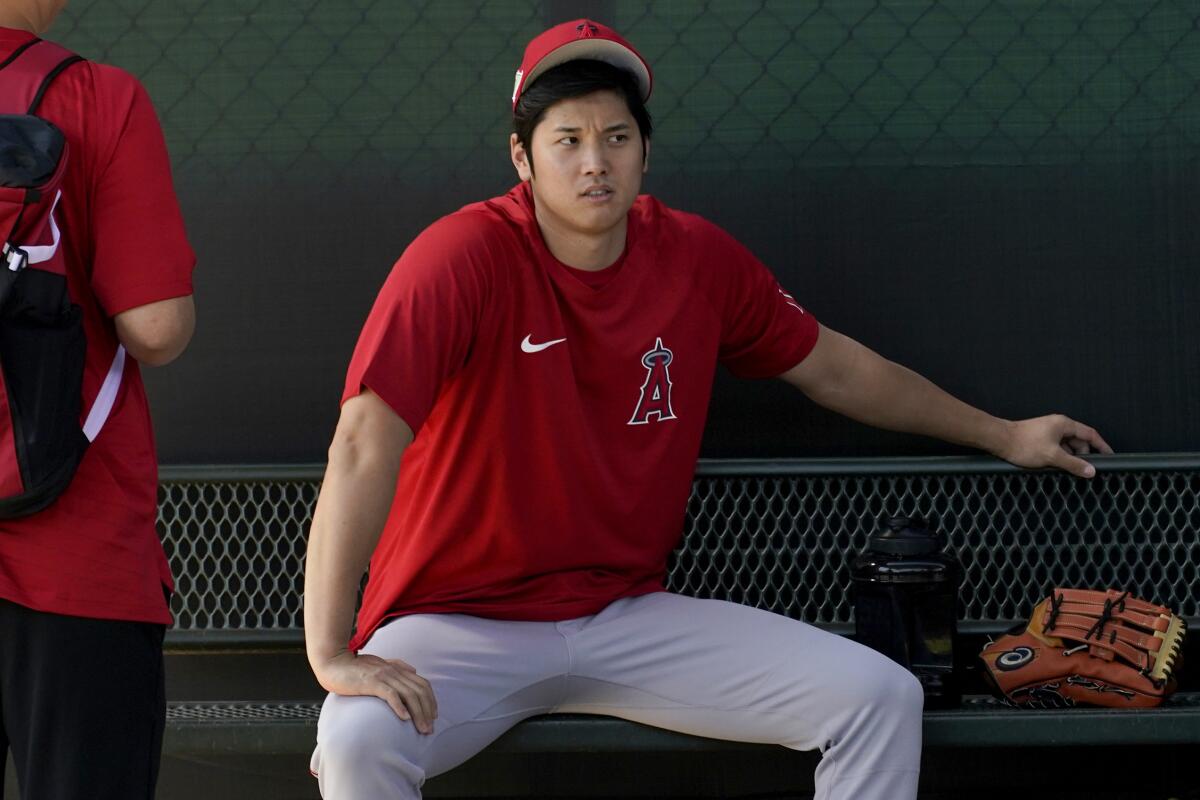
Walsh’s pitching career ended in 2020 with an arm injury and a breakout season at the plate, the first baseman hitting .293 with a .971 OPS, nine homers and 26 RBIs in 32 games of the pandemic-shortened season.
He was an All-Star in 2021, batting .277 with an .850 OPS, 29 homers and 98 RBIs.
“Luckily, I started hitting better, but if I was healthy and thought it was in my best interest to pitch, I would do it,” Walsh said. “My arm didn’t agree with being a two-way guy. I love the competitive aspect of it, but I’d rather hit 600 times than pitch.”
After watching Ohtani in the weight room, the batting cage and the bullpen for seven months last season, Walsh doubts he could withstand the physical rigors of being a two-way player.
“It was completely mind-blowing,” Walsh said. “I think he did such a great job managing his workload, knowing when to get in the weight room, when to get in the cage, when to stay out of the cage. He’s a worker, so I think he probably had to tone it back a little bit, which is what allowed him to be so special.”
Angels general manager Perry Minasian believes prospective two-way players will need a similar drive and determination to succeed in the majors, even if it’s not to Ohtani levels.
“I think a lot of it is want-to,” he said. “You have to have an aptitude to do it, but the workload is incredible from a preparation standpoint.”
Mike Trout, who missed most of last season because of a calf injury, had two singles as the Angels defeated the Arizona Diamondbacks 12-5 on Saturday.
Minasian said he would have “no issues” with a player pursuing a two-way role, as long as his work rate was high and his expectations were realistic.
“I don’t think [Ohtani] is what you’re trying to emulate,” Minasian said. “Maybe certain people are, but you don’t have to do it at that level to be productive. And if you ask managers, if you can perform on the field [as a pitcher], it opens up a lot of flexibility from a roster standpoint.
“I think it will be more of a focus, and there will be more of routine to train for it. You might not see it next year or two years from now, but I think five years from now, 10 years from now, you’ll see a wave of two-way players that you didn’t see in the past, just because of what Shohei has been able to accomplish.”
More to Read
Go beyond the scoreboard
Get the latest on L.A.'s teams in the daily Sports Report newsletter.
You may occasionally receive promotional content from the Los Angeles Times.

